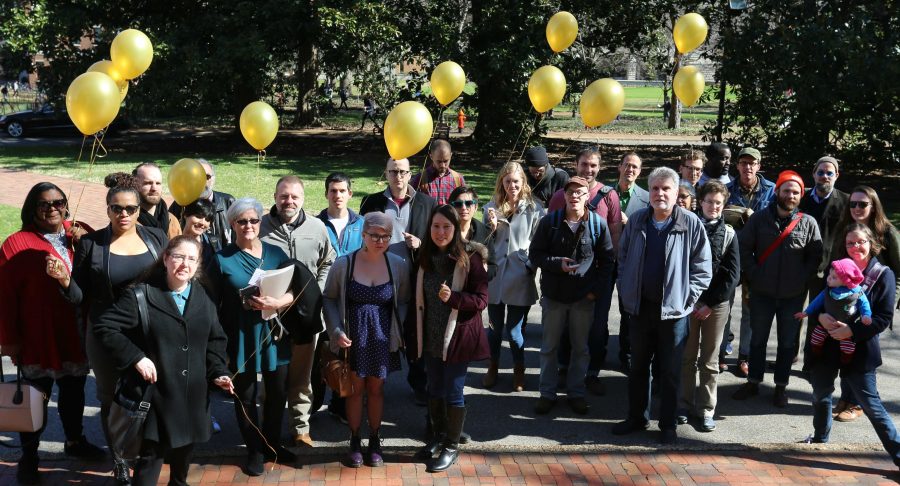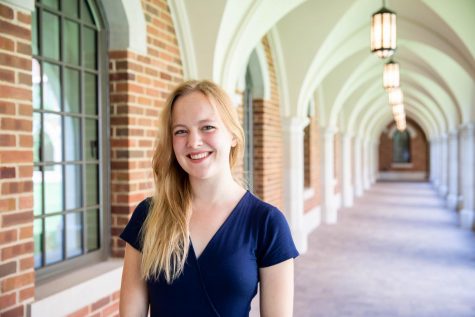In November, a group of Vanderbilt non-tenured faculty members approached Service Employees International Union (SEIU) Local 205 looking for help in organizing a collective bargaining unit composed of full and part time non-tenured faculty members. The organizing group already had a campus presence due to a partnership with a group of graduate students also looking to unionize.
According to Amy Cooter, a lecturer in the department of sociology and a member of the unionization effort organizational team, the push for unionization stemmed from faculty concerns about the need for cost of living increases, transparency in the hiring process and clearly defined responsibilities for different faculty positions.
“In general, people are concerned about things like having cost of living wages that match Nashville’s massively expanding cost of living, that’s something that Vanderbilt frankly has not done a very good job of,” Cooter said. “Also, making sure that non-tenure track faculty are respected and have a voice in their departments, and making sure that they have access to the resources they need to be the best teachers they can be.”
The SEIU filed a petition with the National Labor Relations Board (NLRB) in February, requesting an election to decide whether or not they would represent a collective bargaining unit on campus.
The union is trying to impose a model on an organization where it does not fit
The unionization effort has faced push back from the university, which argues that the union model does not fit at a school like Vanderbilt. According to Vice Provost John Geer, the decentralized nature of the university, in which full time faculty cycle through administrative positions, means that the employer/employee dichotomy of a union isn’t practical.
“Basically, the union is trying to impose a model on an organization where it does not fit,” Geer said. “And that’s the core problem, that’s the core university objection. The university has no problem if our adjunct and part time non-tenure track want to have a union, that is their right, and we would support an election, we wouldn’t oppose it, you make that call. It’s the full time is the problem.”
At the center of the university’s argument is the difference in responsibilities between full and part time non-tenure track faculty. Regardless of tenure or non-tenure track, full time faculty have the opportunity to take on administrative positions and play roles in the running of the university. Geer emphasized that the university is not anti-union and has worked with Laborers Local 383, the union that supports dining, craft and maintenance employees, since 1972. The difference, he said, is that that union has a very clear employer and employee dynamic, while that dynamic doesn’t exist for full time faculty.
Vanderbilt has 46 different faculty titles. Because the university allows individual colleges to determine the titles and roles for faculty in their department, a title in one school might mean a very different thing in another school. While Geer sees this as a positive way in which the university promotes autonomy, Cooter said that the lack of clearly defined job titles and responsibilities leads to confusion and a lack of transparency.
“Right now, there aren’t very clear expectations for people with the same job title across different department lines,” Cooter said. “Part of having a union would make it where we have to be transparent, and we have to make sure everyone is treated fairly.”
Having a union would make it where we have to be transparent
After the petition was filed in February, the university and members of the union effort met to discuss their relationship and options moving forward. On March 29, they reached a compromise and set a date for an election on April 10th. Prior to the election, however, the university withdrew its agreement to hold the election, and the decision of whether or not the SEIU will represent a union of non-tenure track faculty members will be made by the NLRB.
The initial petition for collective bargaining included faculty from the College of Arts and Science, the Blair School, the Divinity School and Peabody College. However, the March 29 agreement stipulated that only full and part time lecturers and adjunct faculty from the College of Arts and Sciences and the Divinity School would be allowed to vote in an election to determine whether or not those faculty members wanted to form a union. According to Geer, the compromise meant the university was giving up their values for the sake of keeping Peabody College and Blair School of Music from being included in the unionization effort.
Following the agreement, faculty from Peabody and Blair petitioned to form their own union. While they were within their rights to do this, the administration saw it as a breach of bargaining in good faith.
“We had an agreement actually, a compromise with the union, and the union broke it. They broke it thirty minutes after signing it,” Geer said. “We had a compromise, they got something, we got something, it was sacrificing our principles but we thought okay we’re compromise here because we can all move forward together.”
I really believe that it will be good for the university, for our students, for our co-workers
As a result of administration pulling their support for the election, the petition will go back to the NLRB for review. A decision is expected to be reached in May. ML Sandoz, Director of Forensics and senior lecturer, said a union would improve relationships within the university.
“I really believe that it will be good for the university, for our students, for our co-workers,” Sandoz said. “I think that there are other institutions, some of them peer institutions, that have very good working relationships with this type of model. It can bring transparency and avenue to listen to one another, engage in dialogue in an effort to make the university a better place for students and a better place of employment for employees.”
The SEIU has assisted other universities in forming non-tenure track faculty unions in recent years as part of their nationwide Faculty Forward campaign. In 2016, Duke, The University of Chicago, Washington University in St. Louis and others successfully petitioned for unions. WashU has ratified their union contracts and both Duke and UChicago are still in the negotiation process.
Because of the successful formation of unions at other universities, Cooter is optimistic that the NLRB will rule in favor of moving forward with the union process.
“Frankly at this point I don’t think that [not forming a union] is likely,” Cooter said. “If it weren’t to work out, I think that there would be some paths forward but they would be less efficient quite frankly. Part of the reason we’re doing this is because administration has had a while to learn about this, to collect data, to address problems that individuals and individual departments have brought up, and nothing has happened. What collective bargaining in general does is make administration take us seriously and treat us as equals. So that’s why that has become the goal and I personally think we have more than enough support to make that happen.”



